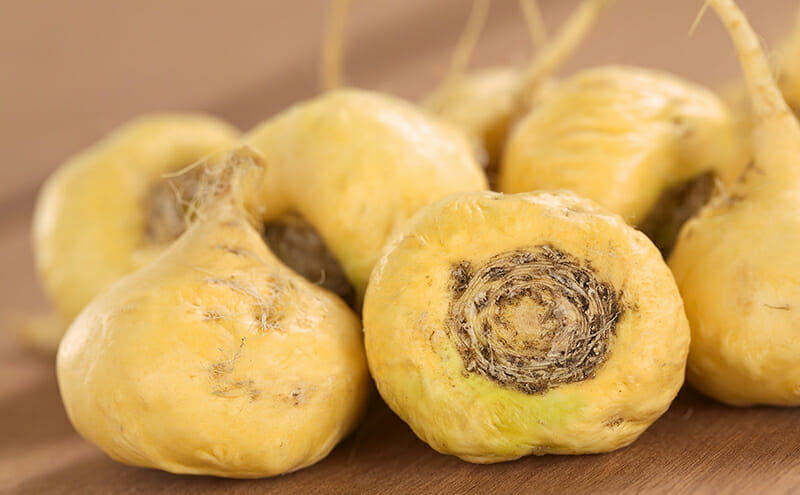Hijacked Harvest: Peruvian Maca in Peril
Chinese “tourists” turn out to be skilled superfood smugglers.
Hijacked Harvest: Peruvian Maca in Peril
Chinese “tourists” turn out to be skilled superfood smugglers.

Ament describes a Wild West scenario where maca farmers are approached with suitcases full of money, while giant sacks of maca are gleefully loaded into trucks. Law enforcement is absent from the fields, and there are few checkpoints across the long southern border with Bolivia, which holds no export ban on maca root. Based on his discussions with suppliers, Arment estimates a couple hundred smugglers are involved at most.
Many Peruvian maca farmers have broken their contracts with national producers who turn the root into powder. Typical cost for a kilo of dried maca has been 12 soles, or about four U.S. dollars — while Chinese tourists are offering 30 to 50 soles. A kilo of potent black maca can now grab 70 soles.
Maca thrives at high altitudes — up to 15,000 feet — which supposedly supports its reputation as an endurance and fertility supplement. Its slightly sweet, malt caramel flavor becomes bitter after sitting around for a few months, and much of the hijacked harvest may be submerged in an alcohol extraction.

Ament and others believe that China is trying to grow its own superior maca, but that discerning Chinese customers are refusing the adulterated powders produced domestically. Managing Director Jamie Spell of Nutraceuticals International Group, one of the largest importers of maca, calls the situation an economic and agricultural affront.
“They are trying to grow this crop on a massive scale in Yunnan Province,” she says. “However, the quality is very low, the taste and shape are different – it’s biologically impossible, basically.” She quotes incredible Chinese market prices: 500 yuans for 50 grams of Peruvian maca root, equivalent to about 1600 U.S. dollars per kilogram.
Spell says China “is notorious for duplicating and imitating compounds,” and Ament points to Chinese patents on GMO maca (GMOs are banned in Peru until 2021). Dr. Carlos Quiros, geneticist and professor emeritus with UC Davis, doesn’t buy this explanation.
“If we’re talking about conventional breeding to produce a higher yielding maca, note that the flowers are really small,” he explains. “They seem to self-pollinate before opening, so removing the anthers to cross-pollinate is extremely difficult.”
The spread of maca is a consequence of globalization, like how lettuce is no longer associated with Egyptian culture.
Dr. Quiros says he can’t think of any trait which could be of value if introduced via genetic engineering. He describes maca as a minor crop, for which transgenesis research would be an expense hard to justify. In his experience, it’s not that simple to develop technology for a trendy food, in order to unleash products on the market.
“As for hijacking an entire harvest for this purpose, that seems overkill,” he says. “One only needs a small sample of maca to easily produce copious seeds.” For him, the spread of maca is a consequence of globalization, like how lettuce is no longer associated with Egyptian culture. After all, Peru is a leading exporter of asparagus, a plant well-loved by ancient Greek and Roman gardeners.
Ament concedes that maca is a wild food that could benefit from developed knowledge. “Farmers are essentially just throwing down seeds, it hasn’t really been intensively cultivated.” He is mostly concerned that Chinese-grown maca will suffer from pollution, referring to Yunnan Province as “a chromium dump.” Dr. Quiros is quick to point out that maca-rich Junin Province in Peru is known for extreme heavy metal pollution — a result of irresponsible mining practices.
The certified organic products of The Maca Team are of the cleanest variety from a small co-op, insists Arment, who started the business while teaching raw food classes in 2004. Now, 10 years in, he’s not sure about tomorrow. When Jamie Spell says her 35-year-old natural products giant is “tremendously affected,” you have to wonder about the little guy.
“We keep waiting for good news,” Ament says, laughing nervously from his Tennessee headquarters. “Not all of the maca is out of the ground yet – that’s my hope.”
Correction: An initial version of this email had Mark Ament’s last name spelled Arment.
Follow us
This work is licensed under a Creative Commons Attribution-NoDerivatives 4.0 International License.
Want to republish a Modern Farmer story?
We are happy for Modern Farmer stories to be shared, and encourage you to republish our articles for your audience. When doing so, we ask that you follow these guidelines:
Please credit us and our writers
For the author byline, please use “Author Name, Modern Farmer.” At the top of our stories, if on the web, please include this text and link: “This story was originally published by Modern Farmer.”
Please make sure to include a link back to either our home page or the article URL.
At the bottom of the story, please include the following text:
“Modern Farmer is a nonprofit initiative dedicated to raising awareness and catalyzing action at the intersection of food, agriculture, and society. Read more at <link>Modern Farmer</link>.”
Use our widget
We’d like to be able to track our stories, so we ask that if you republish our content, you do so using our widget (located on the left hand side of the article). The HTML code has a built-in tracker that tells us the data and domain where the story was published, as well as view counts.
Check the image requirements
It’s your responsibility to confirm you're licensed to republish images in our articles. Some images, such as those from commercial providers, don't allow their images to be republished without permission or payment. Copyright terms are generally listed in the image caption and attribution. You are welcome to omit our images or substitute with your own. Charts and interactive graphics follow the same rules.
Don’t change too much. Or, ask us first.
Articles must be republished in their entirety. It’s okay to change references to time (“today” to “yesterday”) or location (“Iowa City, IA” to “here”). But please keep everything else the same.
If you feel strongly that a more material edit needs to be made, get in touch with us at [email protected]. We’re happy to discuss it with the original author, but we must have prior approval for changes before publication.
Special cases
Extracts. You may run the first few lines or paragraphs of the article and then say: “Read the full article at Modern Farmer” with a link back to the original article.
Quotes. You may quote authors provided you include a link back to the article URL.
Translations. These require writer approval. To inquire about translation of a Modern Farmer article, contact us at [email protected]
Signed consent / copyright release forms. These are not required, provided you are following these guidelines.
Print. Articles can be republished in print under these same rules, with the exception that you do not need to include the links.
Tag us
When sharing the story on social media, please tag us using the following: - Twitter (@ModFarm) - Facebook (@ModernFarmerMedia) - Instagram (@modfarm)
Use our content respectfully
Modern Farmer is a nonprofit and as such we share our content for free and in good faith in order to reach new audiences. Respectfully,
No selling ads against our stories. It’s okay to put our stories on pages with ads.
Don’t republish our material wholesale, or automatically; you need to select stories to be republished individually.
You have no rights to sell, license, syndicate, or otherwise represent yourself as the authorized owner of our material to any third parties. This means that you cannot actively publish or submit our work for syndication to third party platforms or apps like Apple News or Google News. We understand that publishers cannot fully control when certain third parties automatically summarize or crawl content from publishers’ own sites.
Keep in touch
We want to hear from you if you love Modern Farmer content, have a collaboration idea, or anything else to share. As a nonprofit outlet, we work in service of our community and are always open to comments, feedback, and ideas. Contact us at [email protected].by Paul Spencer, Modern Farmer
October 13, 2014
Modern Farmer Weekly
Solutions Hub
Innovations, ideas and inspiration. Actionable solutions for a resilient food system.
ExploreExplore other topics
Share With Us
We want to hear from Modern Farmer readers who have thoughtful commentary, actionable solutions, or helpful ideas to share.
SubmitNecessary cookies are absolutely essential for the website to function properly. This category only includes cookies that ensures basic functionalities and security features of the website. These cookies do not store any personal information.
Any cookies that may not be particularly necessary for the website to function and are used specifically to collect user personal data via analytics, ads, other embedded contents are termed as non-necessary cookies.
Hi! Thank you for this article, this is such an informative post. However, I think you missed to elaborate on the benefits of maca and its powdered form, which is very important, especially for those who are looking to boost their health through their diet. I discussed this on an in-depth post, and if you agree with me, you’re free to use my article as a source: https://karmaeating.com/blogs/latest-posts/maca-powder-the-ultimate-health-guide More power to you! 🙂